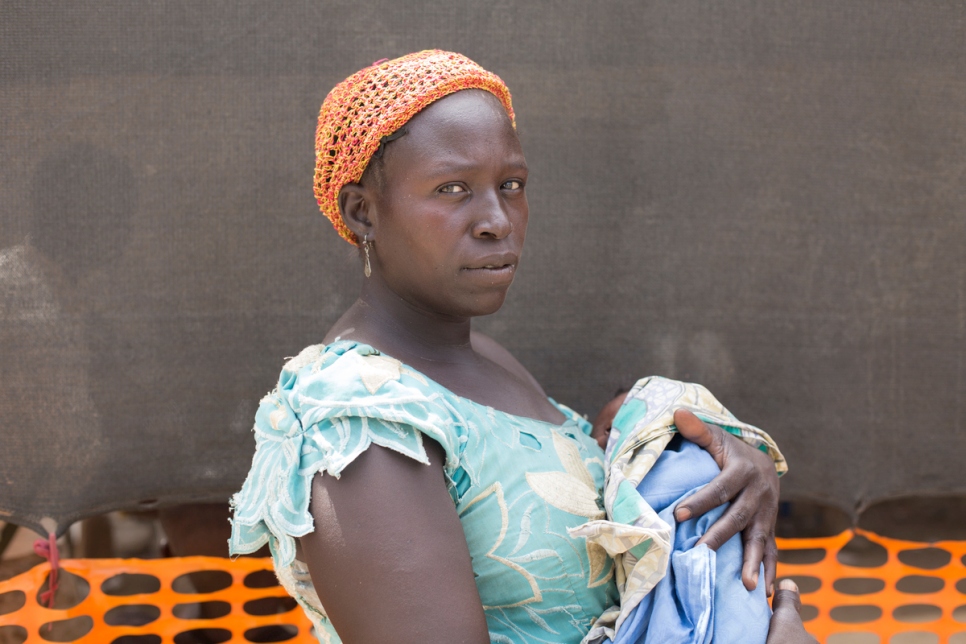UNHCR seeks additional support to respond to the Nigeria situation

Magdelena, 35, a Nigerian returnee and her two-week old son, Musa, came back from Cameroon in mid-May 2017. © UNHCR/Rahima Gambo
UNHCR, the UN Refugee Agency, is launching a supplementary appeal for an additional US$9.5 million to scale up its activities in north-east Nigeria, as a result of an unexpected surge in self-organized returns of Nigerian refugees since the beginning of the year, mainly from Cameroon.
“This is a new emergency, which requires urgent attention. Many of these returnees are unable to go back to their homes due to security concerns and end up being displaced again, in dire humanitarian conditions. Even if UNHCR does not promote or facilitate these returns, we must do everything we can to assist these vulnerable people,” said Volker Türk, UNHCR’s Assistant High Commissioner for Protection.
Many returnees stay in camps and displacement sites in precarious and overcrowded conditions. The situation is particularly difficult in the town of Banki, in north-east Nigeria, where many are forced to live outdoors and have limited access to drinking water, food and medicine.
“During my recent visit to the region, I was not only appalled by the scale of the humanitarian needs, but also deeply shocked at the level of trauma, social division and distrust,” said Türk, who visited both Nigeria and Cameroon over the past three weeks.
“We urge the international community to pay more attention to this highly complex and challenging humanitarian and security situation,” said the UNHCR official.
As vulnerabilities increase over time, funding is, unfortunately, lagging behind needs. So far, UNHCR has received US$41.1 million from donors out of a total funding requirement of US$179.5 million for 2017 for Nigeria, Cameroon, Niger and Chad.
“The current funding for the relief effort does not do justice to the exceptional hospitality offered by host governments and communities,” said Valentin Tapsoba, Director of UNHCR’s Regional Bureau for Africa, during a donor briefing on the Nigeria situation on 24 July, 2017.
Additional funding would allow UNHCR to increase its presence in border locations and improve border and protection monitoring. The UN Refugee Agency also plans to expand reception facilities and launch mass information campaigns to ensure that Nigerian refugees in Cameroon’s Far North have accurate and updated information on the situation prevailing in areas of return in Nigeria.
“In my recent discussions with both Governments, I also stressed the need to set up a mechanism that can both address legitimate security concerns and the protection needs of refugees,” he added. “I received assurances that action had been taken to stop involuntary returns, an issue that has been of deep concern to UNHCR,” said Türk.
“The first meeting of the Tripartite Commission which is expected to take place early August will be a positive step forward,” he added. The Commission was set up after the signature, last March, of a tripartite agreement between UNHCR, Nigeria and Cameroon on voluntary repatriation of Nigerian refugees once conditions are conducive.
Between January and June 2017, nearly 135,000 refugees returned to Nigeria, mainly women and children. The majority left Minawao and Kolofata refugee settlements, in the Far North Region of Cameroon.
UNHCR is helping to respond to the needs of more than 2.5 million people who have become refugees, internally displaced or returnees across the Lake Chad region as a result of armed conflict.
Media contacts:
- In Geneva, Cécile Pouilly, pouilly@unhcr.org, + 41 79 108 26 25
- In Dakar, Romain Desclous, desclous@unhcr.org, +221 77 786 396 385
